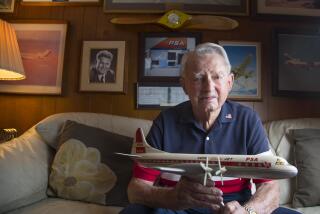Lord Cheshire; WW II Hero, Philanthropist
- Share via
LONDON — Lord Cheshire, Britain’s most decorated World War II pilot who later set up homes for wounded former servicemen around the world, has died. He was 74.
He died Friday of motor neuron disease, said a spokeswoman for the Ryder Foundation for the sick and disabled, which was founded by his wife, Baroness Ryder.
“He was, in the true sense of the word, a national hero,” Prime Minister John Major said in a statement.
“In war, Leonard Cheshire was a hero. In peace, he served his nation no less well. Together, he and Sue Ryder touched directly the lives of thousands of people and gave them hope and encouragement. Through his example he reached millions more,” Major said.
Geoffrey Leonard Cheshire made headlines in August, 1939, as a 22-year-old Oxford undergraduate when he completed a lighthearted student bet to travel to Paris and back on $1.80.
A month later, Britain went to war against Germany and Cheshire took up a commission in the Royal Air Force.
He flew more than 100 bombing missions over Germany, when the average pilot’s life expectancy was 25 missions, and took a drop in rank to command 617 Squadron, which gained fame as the Dambusters for their attacks on vital German dams.
The world at large learned of the technical difficulties and personal risks involved in the attacks on the Ruhr dams when the film “The Dam Busters,” starring Michael Redgrave and Richard Todd, was released in 1954.
In 1945, Cheshire was the British observer at Nagasaki, the second Japanese city to be devastated by a nuclear bomb. Although he said later that he was struck by the immensity of the destruction, the explosion did not alter his view on the necessity of that mission.
Cheshire was awarded the Victoria Cross, Britain’s highest decoration for gallantry, in 1944 for “placing himself invariably in the front of battle.”
After the war, he set up the Cheshire Foundation Homes, which provide care for ex-servicemen in 50 countries.
Queen Elizabeth II appointed him to the Order of Merit in 1981 and he was made a life peer in the House of Lords in 1991.
He is survived by his wife, a son and a daughter.
More to Read
Sign up for Essential California
The most important California stories and recommendations in your inbox every morning.
You may occasionally receive promotional content from the Los Angeles Times.











